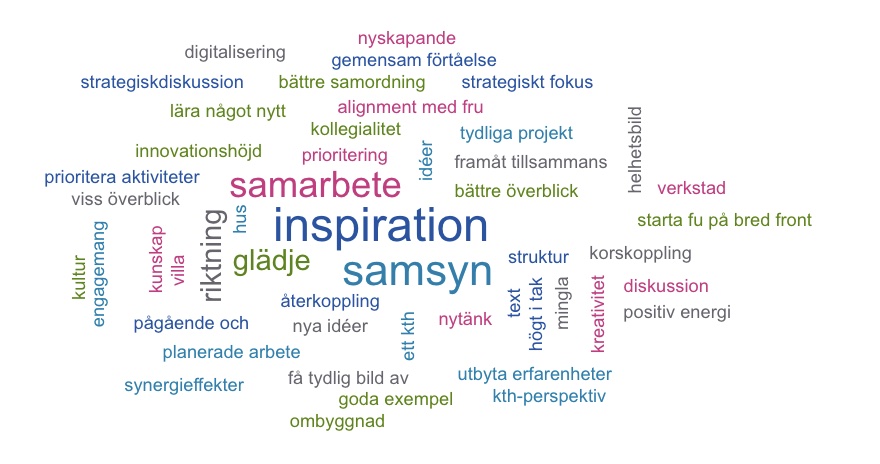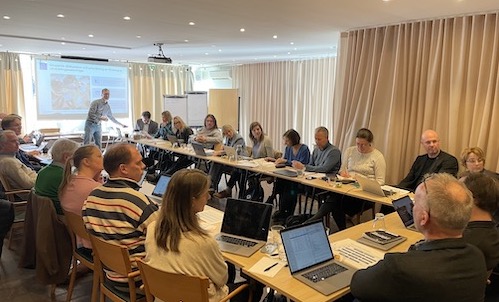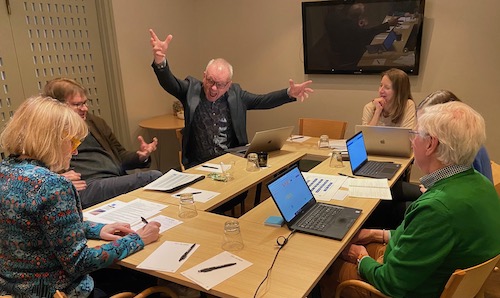Inspiration, collaboration, and synergy set the tone for the programme's first project conference
Project meet-up for Future Education 3 April 2023

The programme management for Future Education had invited KTH's management team and the schools' Directors of First and Second Cycle Education (GA) and deputy GA to discuss proposals for projects that develop KTH's education. The starting point was that the development projects should be scalable, pattern-breaking and that they can be started during the autumn semester of 2023. Inspiration, synergy, cooperation, direction, and joy dominated the participants' expectations for this sunny half-day, which both began and ended by KTH's President Anders Söderholm.
An important milestone for KTH and Future Education

For most people in this context, the day was unique, both for the constellation as such but also as a start-up for the change programme. After today's milestone, more KTH colleagues will be involved and activated in work with Future Education at KTH. In other words, development work that is still being done can now be given a direction and there are better conditions to achieve synergies and thus avoid sub-optimisation.
Start-up for programme organisation
This new constellation also constitutes important components of the programme's organisation. KTH's management group becomes the programme's steering group. The programme group - also called Core team - consists of the extended meeting group GUx of the First and Second Cycle Education Committee (GU), whose composition varies according to needs.
GUx meetings with the GA and Deputy GA have been held on a monthly basis since spring 2022 to discuss training development and methodological support for the implementation of the program.
Projects for the development of KTH's education

Presentations and group discussions on the project proposals
Some 40 proposals for development initiatives were presented by the schools and program management. The project proposals were then discussed both in groups and jointly to ensure a common understanding across schools and to find synergies between the different projects.
It was concluded that the project proposals presented were well thought out, that most will and should be implemented and that there are synergies.
Two project portfolios
Two project portfolios were identified: one with co-funding and thus partial coordination and governance from Future Education and one with funding solely from schools and/or other sources.The last group of projects can still benefit from methodological support and coordination from Future Education.
Joakim Lilliesköld, the programme manager of Future Education at KTH, commented on the day:
– This was an important day for Future Education and hopefully for KTH. It is highly inspiring to experience the consensus we have across school boundaries that we want to develop education at KTH together. Now we are finally moving from a lot of preparatory work and reports to action. And even though this day has resulted in several exciting development projects, it is essential to point out that this results from a relatively rapid process during the first months of the year. We need to find ways to develop even more development and pilot projects and, above all, learn from the projects that are already underway.
Next steps
The project proposals presented are at different stages of development. Some project ideas need to be refined, while others already have designated project managers who are just waiting for a kick-start.
The Future Education programme management will assist the various project ideas in the spring to ensure that the projects get off to a good start and that the expected synergies can be realised. This includes developing project plans and developing standard templates for project documentation as well as methodological support for the projects themselves. The project documentation will consist of so-called A3s – a well-proven methodology used in many projects, not least in industry – to reduce the administrative burden in favour of actual development work.
The programme management will also provide operational support with a first overview of the project portfolio, so that support and activities can be paced.
Information about the projects will be published on the web pages of programme.
The activity is included in the annual cycle of operational planning
KTH's President Anders Söderholm concluded the day and expressed the wish that the day's activity should return annually and be adapted to the work with operational planning at KTH. A wish that was emphatically shared a few days later in a follow-up meeting with the programme group.
Read the President's blog post 2023-04-17: KTH builds education programs for the future
Text: Sofie Kim and Per Fagrell
Related
First and Second Cycle Education Committee (GU)
